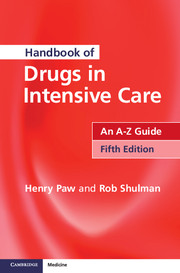Book contents
- Frontmatter
- Contents
- Introduction
- How to use this book
- Abbreviations
- Acknowledgements
- DRUGS: AN A–Z GUIDE
- SHORT NOTES
- Routes of administration
- Loading dose
- Drug metabolism
- Enzyme systems
- Drug excretion
- Drug tolerance
- Drug interactions
- Therapeutic drug monitoring
- Target range of concentration
- Pharmacology in the critically ill
- Cardiopulmonary resuscitation
- Drugs in advanced life support
- Management of acute major anaphylaxis
- Management of severe hyperkalaemia
- Management of malignant hyperthermia
- Sedation, analgesia and neuromuscular blockade
- A practical approach to sedation and analgesia
- Opioid Conversion table
- Management of status epilepticus
- Prevention of delirium tremens and alcohol withdrawal syndrome
- Prevention of Wernicke–Korsakoffsyndrome
- Anti-arrhythmic drugs
- Inotropes and vasopressors
- Bronchospasm
- Anti-ulcer drugs
- Immunonutrition in the ICU
- Corticosteroids
- Short synacthen test
- Bone marrow rescue following nitrous oxide
- Antioxidants
- Post-splenectomy prophylaxis
- Anti-microbial drugs
- Bacterial gram staining
- Antibiotics: sensitivities
- Renal replacement therapy
- Extracorporeal drug clearance: basic principles
- Drug doses in renal failure/renal replacement therapy
- Chemical pleurodesis of malignant pleural effusion
- APPENDICES
- DRUG INDEX
- IV COMPATIBILITY CHART
Pharmacology in the critically ill
Published online by Cambridge University Press: 05 November 2014
- Frontmatter
- Contents
- Introduction
- How to use this book
- Abbreviations
- Acknowledgements
- DRUGS: AN A–Z GUIDE
- SHORT NOTES
- Routes of administration
- Loading dose
- Drug metabolism
- Enzyme systems
- Drug excretion
- Drug tolerance
- Drug interactions
- Therapeutic drug monitoring
- Target range of concentration
- Pharmacology in the critically ill
- Cardiopulmonary resuscitation
- Drugs in advanced life support
- Management of acute major anaphylaxis
- Management of severe hyperkalaemia
- Management of malignant hyperthermia
- Sedation, analgesia and neuromuscular blockade
- A practical approach to sedation and analgesia
- Opioid Conversion table
- Management of status epilepticus
- Prevention of delirium tremens and alcohol withdrawal syndrome
- Prevention of Wernicke–Korsakoffsyndrome
- Anti-arrhythmic drugs
- Inotropes and vasopressors
- Bronchospasm
- Anti-ulcer drugs
- Immunonutrition in the ICU
- Corticosteroids
- Short synacthen test
- Bone marrow rescue following nitrous oxide
- Antioxidants
- Post-splenectomy prophylaxis
- Anti-microbial drugs
- Bacterial gram staining
- Antibiotics: sensitivities
- Renal replacement therapy
- Extracorporeal drug clearance: basic principles
- Drug doses in renal failure/renal replacement therapy
- Chemical pleurodesis of malignant pleural effusion
- APPENDICES
- DRUG INDEX
- IV COMPATIBILITY CHART
Summary
In the critically ill patient, changes of function in the liver, kidneys and other organs may result in alterations in drug effect and elimination. These changes may not be constant in the critically ill patient, but may improve or worsen as the patient's condition changes. In addition, these changes will affect not only the drugs themselves but also their metabolites, many of which may be active.
Hepatic disease
Hepatic disease may alter the response to drugs, in several ways:
• Impairment of liver function slows elimination of drugs, resulting in prolongation of action and accumulation of the drug or its metabolites.
• With hypoproteinaemia there is decreased protein binding of some drugs. This increases the amount of free (active) drug.
• Bilirubin competes with many drugs for the binding sites on serum albumin. This also increases the amount of free drug.
• Reduced hepatic synthesis of clotting factors increases the sensitivity to warfarin.
• Hepatic encephalopathy may be precipitated by all sedative drugs, opioids and diuretics that produce hypokalaemia (thiazides and loop diuretics).
• Fluid overload may be exacerbated by drugs that cause fluid retention, e.g. NSAID and corticosteroids.
• Renal function may be depressed. It follows that drugs having a major renal route of elimination may be affected in liver disease, because of the secondary development of functional renal impairment.
• Hepatotoxic drugs should be avoided.
- Type
- Chapter
- Information
- Handbook of Drugs in Intensive CareAn A-Z Guide, pp. 252 - 253Publisher: Cambridge University PressPrint publication year: 2014



